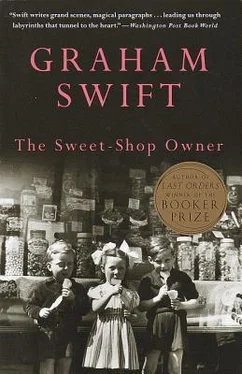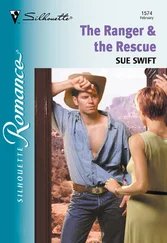Graham Swift - The Sweet-Shop Owner
Здесь есть возможность читать онлайн «Graham Swift - The Sweet-Shop Owner» весь текст электронной книги совершенно бесплатно (целиком полную версию без сокращений). В некоторых случаях можно слушать аудио, скачать через торрент в формате fb2 и присутствует краткое содержание. Год выпуска: 2012, Издательство: Vintage Books USA, Жанр: Современная проза, на английском языке. Описание произведения, (предисловие) а так же отзывы посетителей доступны на портале библиотеки ЛибКат.
- Название:The Sweet-Shop Owner
- Автор:
- Издательство:Vintage Books USA
- Жанр:
- Год:2012
- ISBN:нет данных
- Рейтинг книги:4 / 5. Голосов: 1
-
Избранное:Добавить в избранное
- Отзывы:
-
Ваша оценка:
- 80
- 1
- 2
- 3
- 4
- 5
The Sweet-Shop Owner: краткое содержание, описание и аннотация
Предлагаем к чтению аннотацию, описание, краткое содержание или предисловие (зависит от того, что написал сам автор книги «The Sweet-Shop Owner»). Если вы не нашли необходимую информацию о книге — напишите в комментариях, мы постараемся отыскать её.
The Sweet-Shop Owner — читать онлайн бесплатно полную книгу (весь текст) целиком
Ниже представлен текст книги, разбитый по страницам. Система сохранения места последней прочитанной страницы, позволяет с удобством читать онлайн бесплатно книгу «The Sweet-Shop Owner», без необходимости каждый раз заново искать на чём Вы остановились. Поставьте закладку, и сможете в любой момент перейти на страницу, на которой закончили чтение.
Интервал:
Закладка:
The attacks were worse at night. They frightened him with their violence. Often they slept with the windows open and the pale green curtains drawn back, but there was never enough air in that room. Was it to be saved she gasped and clawed, or to be left alone? For sometimes she clutched with those flailing hands, sometimes fended. And it was never, it seemed, against the illness she struggled but against something else.
No change. Outside the hospital, through the cafeteria window, there were railings, notices, a row of plane trees, and the dark, glossy statue of some Victorian benefactor. Out-patients, with sticks and thick coats, trailed over the asphalt, and mushroom-coloured ambulances glided in and out of the entrance gates. Any pattern of emotional distress? There was a flower-stall beyond the railings on the pavement, and as he drank his tea he watched the woman with a red head-scarf and a faded apron pick the bunches of gold and bronze chrysanthemums, daffodils or irises and wrap them, with a twist, in the sheets of paper.
Should he have asked, pressed, more than he did? Gone unannounced, despite her strictures, to Doctor Cunningham? Or confronted Doctor Field, hammered, flailing, on the surgery door on one of those visits when all he did was take the prescription form from the green felt board; clutched the poor man by the collar: ‘Doctor, save my wife! What is happening to my wife?’ No: that would have alarmed her more than any illness. For didn’t he know by now, didn’t he understand, the terms of the agreement? He watched the flower-lady, from the window, shaking out the wet stems, stripping the surplus leaves with a knife.
19
The new till thumped and rang on the counter, the change tinkled, and Mrs Cooper said, dropping in the coins, putting the pound notes under the clip, as if she herself were the cause of success, ‘Busy day, Mr Chapman. How much today?’
Money. It was mounting in the little piles in the till, and on the shelves of the safe in the stock room where he locked it overnight. Twelve, thirteen pounds a day. Prices were up, but people were buying. Bigger orders, new lines; and already, so they said, his paper deliveries were exceeding Henderson’s across the common. They smiled when they saw him come in, twice a week, to bank his cash. And at night, after checking the lights, the locks, the burglar alarm, he bore home in his briefcase the figures (Cash, Petty Cash, Shop Takings, Stock Book, Trading Account, Profit and Loss); neat, symmetrical columns, which now and then she would want to see. ‘Good, Willy,’ she’d approve. The maroon-covered books and the file of accounts would be open on the baize table-cloth. He was a slow calculator — hadn’t he always been slow, brainless at school? — and Dorry, whose arithmetic, even then, was deft, might have helped him, sitting by his side, totting the figures. But Irene wouldn’t have it. She would not let Dorry even glance at those books. So that when she crept in from her bedroom, where she did her homework, he would only say, with a joking sigh, ‘Doing my homework too, Dorry.’ But it wasn’t a joke; it was more an apology. And he saw the look of criticism in her eyes.
‘Good, Willy, good,’ as he closed the books. ‘Now you rest. I’ll make a cup of tea.’ And she would raise herself up, with an air of relief and fresh purpose, clatter in the kitchen, as if it were better than any medicine, better than any of Doctor Cunningham’s treatments.
Across the road Powell, puffing a little, brought out his crates of oranges and lemons and stacked them on the trestles. Better produce, and more of it. Oranges from Morocco, lemons from Cyprus. Do you remember when you never saw a banana? Longer queues through his shop door. But still he put the best goods on the table outside, polishing the apples on his sleeve, arranging the tomatoes and creamy sticks of celery on the carpets of imitation grass. And still he wore the same grey cardigans over his scars. The home-decorating shop was thriving. In the Calypso coffee-bar (for so it had become) surly youths with swept-back hair were sitting at the tables; Mrs Cooper frowned on them and their juke-box music, but the bluff proprietor, pumping the coffee machine, welcomed them paternally. The attendants in Armstrong’s garage, in blue overalls with yellow collars, waltzed on the long arms of the petrol pumps. And in Hancock, Joyce and Jones, Hancock was congratulating himself on the surges in the property market. A slight taunt showed under the peppery moustache as he dropped in for his cigars or his evening paper, and said, watching him rattle the pennies in the till, ‘Coming on is it?’; and the same taunt would remain, just visible, as he added, ‘Irene any better?’ The Sunbeam exchanged for a Wolseley, and the raffishness of bachelordom for the suavities of success. Leather gloves and camel coats. Golf on Sundays with architects and property dealers. Dinner parties at which the lovely Mrs Hancock would shine as hostess. And everyone agreed (the guests would finger their glasses beside importunate or jealous wives) that Helen Hancock was the perfect foil to his success. Old ’Cock had picked a peach.
*
He fitted the bubble-gum machine outside the shop: red, white and yellow balls of gum jostling inside the perspex cover with plastic rings and trinkets. And a cigarette vendor, next to the newspaper placards and the oblong board on the abutting wall in Briar Street on which, every week, a man would paste the coming programmes at the Odeon. John Mills and Kenneth More in cheerful re-enactments of the war. History enshrined in make-believe. Like the lurid stories in the boys’ comics he sold in the shop: grim-jawed fighter-pilots and ogreish Germans. What war? A packet of gum please, and another card in the series ‘Great Battles of World War Two’.
He hung the advertisements and the illuminated signs from the facia. ‘Craven A’, ‘Corona’, ‘Gold Flake’, ‘Players Please’, ‘Lyons Maid Sold Here’. Wired them up himself, and scanned the advertisers’ catalogues for additions and replacements. New awnings, black and white striped, and neon lighting over the door. And the windows — the windows were his own special concern. He allowed Mrs Cooper to arrange the displays only under the strictest supervision, and most often it was he alone who at slack periods or after evening closing would snake and stalk through the precarious stands, as through tangled foliage, positioning the imitation sweets — plastic chocolates and wooden toffees — the cardboard cut-outs, the silver and gold paper, and emerging afterwards onto the pavement to gauge the effect. People complimented him on his windows, their profusion, their colour. ‘Highly commended’ in the local trade gazette for window dressing. At dusk the corner of Briar Street scintillated like a fair-ground. And he was silently pleased at the effect of his labours — of something which promised real goods, real riches within, but was itself quite specious. So that he looked forward to those seasons when special occasions allowed him to heighten the trickery. Christmas, Easter. The allure of tinsel and fake snow in the window, the enticements of chocolate boxes and gift-pack cigars. Easter eggs. Fireworks. Useless things.
Fourteen, fifteen pounds a day. He folded the papers with a flick between his thumb and forefingers and cupped his palm for the coins. Up the road they came from the station, with their briefcases and raincoats and work-weary expressions; the same faces stopping by in the evening as stopped by in the morning. ‘Evening Mr Chapman’, ‘Okay, Mr Chapman?’ ‘My usual, Mr Chapman.’
And he didn’t alter for any of them his shop-keeper’s image, his ‘much obliged’ and ‘thanking you’. It was they who bought and he who sold. That was the arrangement. Let them think of him as some cut-out figure, popping up like the sums on the till, behind the counter: Mr Chapman, the sweet shop man.
Читать дальшеИнтервал:
Закладка:
Похожие книги на «The Sweet-Shop Owner»
Представляем Вашему вниманию похожие книги на «The Sweet-Shop Owner» списком для выбора. Мы отобрали схожую по названию и смыслу литературу в надежде предоставить читателям больше вариантов отыскать новые, интересные, ещё непрочитанные произведения.
Обсуждение, отзывы о книге «The Sweet-Shop Owner» и просто собственные мнения читателей. Оставьте ваши комментарии, напишите, что Вы думаете о произведении, его смысле или главных героях. Укажите что конкретно понравилось, а что нет, и почему Вы так считаете.












